Table of Contents
You can find a lot of information about glutamine on the Internet or different forums. It is a nutritional supplement that has evoked great interest among bodybuilders and athletes. Find out more about the proven benefits and effects of taking glutamine during an illness, stress, or sports activity.
What is glutamine?
Glutamine is a building block of proteins and belongs to conditionally essential amino acids. This means that normally the body can create it by itself, but in certain cases, it is necessary to supplement it in an increased amount in the form of food or supplements. Glutamine production takes place mainly in skeletal muscle, from which it is distributed through the blood to organs that use it. These include the muscles, kidneys, liver and small intestine. [12] [13] Up to 60% of glutamine is found in muscle tissues, but it can also be found in the liver, lungs, brain and blood plasma. [48] Glutamine can also be taken in from natural sources such as eggs, low-calorie meat, whey and casein protein.
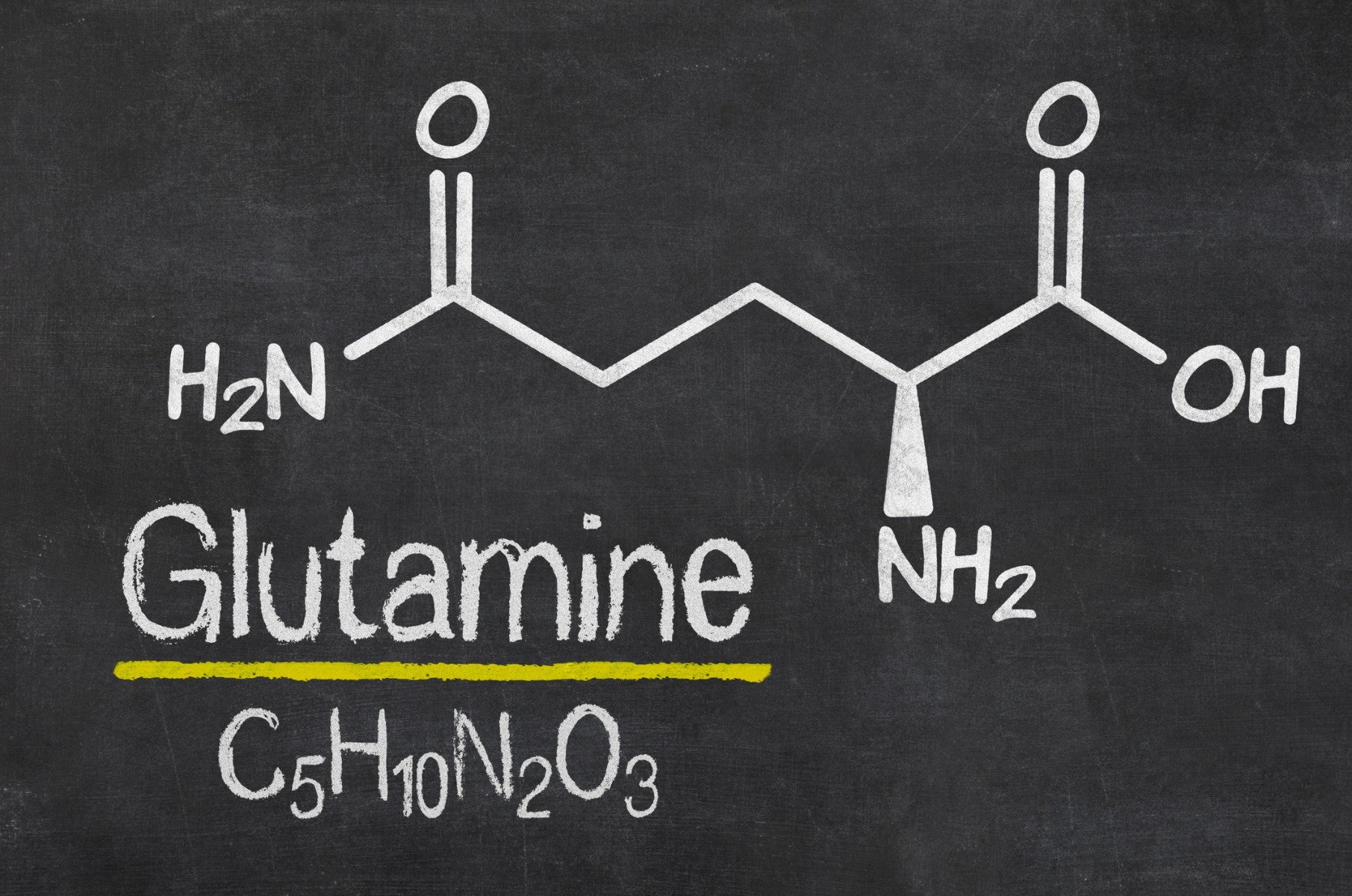
It is inevitable for human health because it has many positive effects. It promotes the proper functioning of the intestines and immune system, it is a part of chemical reactions and is used to produce both amino acids and glucose, while maintaining optimal levels of nitrogen. In society, glutamine is known mainly as a nutritional supplement for muscle growth and regeneration. [1] [2] Therefore, we will find it as a separate amino acid on the market, which is sold in the form of powder or tablets. Many manufacturers even reinforce their protein drinks by adding glutamine to their composition. They do this because glutamine can support athletes’ health and immunity, reduce muscle pain, improve hormone production, hydrate muscle cells and increase glycogen stores. [48]
In the past, glutamine has been used mainly for burns and cuts, today it is prescribed by doctors in the treatment of patients who lose muscle mass. These are people suffering from HIV, AIDS or cancer. Glutamine helps them build muscles and effectively alleviate muscle loss. [1]
You might be interested in these products:
Sources of Glutamine
Large amounts of glutamine can be found in high protein food, and therefore particularly in meat and animal products. It can also be found in low-calorie products and in whey, from which whey protein and casein are produced. [3]
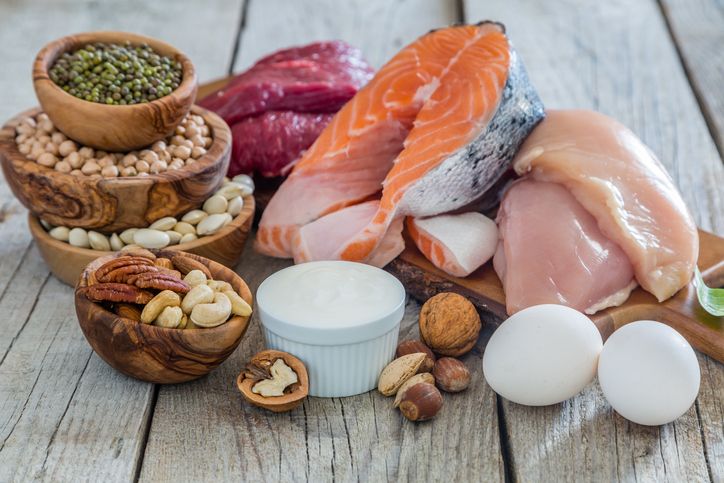
Beef, chicken and lamb are the richest sources of glutamine. Then it can also be found in sea fish, mainly in salmon. Glutamine-rich food is also milk, dairy products and eggs. It can also be found in nuts, cabbage or in beans. [4] See the table below for an overview of the amount of glutamine per 100 g of food. [11]
| Food | Glutamine content per 100 g |
|---|---|
| Beef | 1,2 g |
| Eggs | 0,6 g |
| Tofu | 0,6 g |
| Corn | 0,4 g |
| Milk | 0,3 g |
| White Rice | 0,3 g |
Usually, a person is able to produce enough glutamine for his own needs or to take in the necessary amount via diet. However, there are situations when its supplementation is necessary for health reasons. [5] Glutamine deficiency is a particular threat to vegetarians, vegans, people with low protein intake, as well as endurance athletes and those undergoing high-intensity training. [1] Therefore, these groups of people should consider the increased intake ofglutamine.
Reasons for Glutamine Deficiency
The cause of glutamine deficiency is mostly protein-poor diet, intensive and long-term sports activity or serious illness. In these cases, the body runs out of glutamine more than it can produce or ingest from food. These are cases like [24]:
- extreme stress [6]
- trauma
- serious infection
- very intense training
- radiotherapy or chemotherapy [7] [8]
- immune disorders such as HIV or AIDS [9]
- chronic digestive problems
- low protein diet [5]
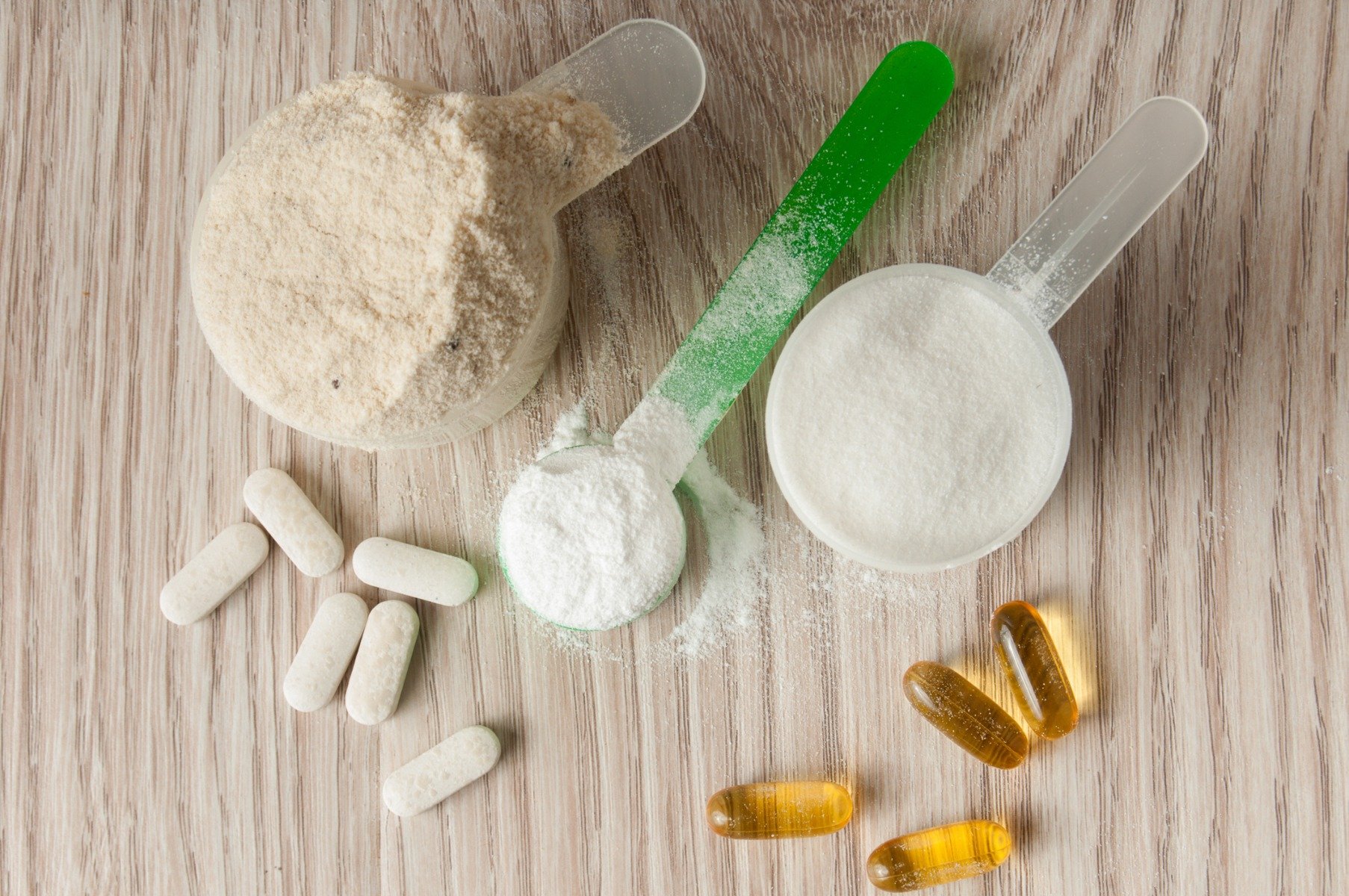
Benefits of Glutamine for Health
The amino acid glutamine has a number of health benefits for the proper functioning of the body. The answer to the question why you should take glutamine can be found in its many effects. Glutamine:
- supports the immune system [15]
- improves muscle regeneration and restores strength after training [35]
- increases the level of growth hormone [37]
- supports proper bowel function [32]
- protects the organism from stress [21]
- allows the growth of white blood cells [14]
- helps with wound healing [16]
- improves brain function[26]
- increases nitrogen levels at the time of disease [19]
- prevents the lowering of BCAA amino acid level after injury [20]
- protects the heart during a heart attack or surgery [22]
- prevents fatty liver disease (only with non-alcoholics) [23]
- supports recovery after surgery [18]
- reduces side effects of chemotherapy [17]
- alleviates muscle loss in AIDS and HIV patients [1]

Recommended Dosage of Glutamine
Glutamine should be taken at a dose of 5 g or more. [1] Patients with HIV receive 8 to 40 g of glutamine per day. [2]The ideal amount of daily glutamine intake to achieve the most effective results for athletes has not yet been established. However, the recommended dose is about 2 to 5 grams twice or three times a day. With a very intense sports activity, it is recommended to take 10 g of glutamine twice a day.
Glutamine is best taken just before or after training and in the evening before bedtime. It is good to take it with a small portion of food or mix it in the protein. It should not be forgotten to supplement glutamine even on non-training days, because only like this it can effectively support metabolism and muscle regeneration. When taking glutamine, it is also recommended to consume vitamin B, which regulates its production in the body. [25]

Side Effects of Glutamine
No side effects have been demonstrated with a daily dosage of glutamine up to 40 g. Nevertheless, it should be avoided by pregnant and breastfeeding women, people with hepatic or cirrhosis disorders, patients with mental disorders or seizures. However, the long-term intake of glutamine in large amounts has not been sufficiently examined yet. We can also find gaps in the research of glutamine supplementation in the diet of athletes. [2]
Benefits of Glutamine for Athletes
Glutamine is an extremely popular dietary supplement for bodybuilders, weightlifters and other athletes. However, opinions on its effectiveness and experience with its use are different. We’ll offer you some reasons why glutamine may be necessary for you in the article below. However, we will also talk about the deceptive effects that are spreading over the Internet.
Glutamine and Protein Synthesis
Glutamine is an amino acid closely related to muscle protein synthesis. Excess of glutamine causes an anabolic state that prevents muscle loss. Conversely, deficiency of this amino acid causes catabolism. [44] [45] Scientists have observed these phenomena when administering glutamine intravenously. [47]
The advantages of glutamine include its ability to reduce the rate of leucine oxidation and increase its deposition. This has a positive effect on the effects of leucine in skeletal muscle cells. Therefore, glutamine is recommended to be taken in combination with BCAA. [46]

Glutamine and Muscle Growth and Regeneration
Scientists and experts have examined the effects of glutamine supplementation on the increase of muscle growth, physical performance and strength. They were based on the argument that glutamine is a building block of muscle tissue. [27]
Research results, however, confirm these effects of glutamine in minimal amounts. In one study, a group of people used glutamine while the other group received a placebo. The research lasted 6 weeks and both groups underwent weight training. At the end of the study, both muscle mass and strength increased in both groups. However, the difference between the groups was minimal. [28]
Still, some studies suggest that ingestion of glutamine supplements in combination with other dietary supplements such as branched-chain amino acids BCAA or whey protein, increases muscle mass growth and physical performance. [34] However, these effects have not been demonstrated with the usage of glutamine itself.
Although glutamine does not directly contribute to muscle mass growth, it takes care of muscle regeneration after strenuous training. Glutamine supplementation is effective in fighting muscle fever and restores strength. [29] [30]

Glutamine and Muscle Pain Relief
A higher dose of glutamine (0.3 g per kilogram of weight) can reduce muscle damage and improve muscle regeneration, according to the study. The research was conducted on a group of people who used glutamine immediately after a hard workout and additional supplement doses over the next 3 days. [35]
On the other hand, in the study of young men who did not engage in sports activity and received 0.1 g/kg of glutamine three times a week for 4 weeks, this effect was not demonstrated. It should be noted, however, that the difference between the two studies lies in the test group, the amount of glutamine and its use. These factors could cause a different result of both tests. [36]
Another study of 23 athletes examined the effect of glutamine in combination with leucine. The test group received a dose of 0.3 g/kg of glutamine and 0.087 g/kg of leucine 30 minutes before training, immediately after training, and then after 24, 48 and 72 hours. The combination of leucine and glutamine was more effective at restoring strength than leucine alone. [39]
We found one study that involved both women and men in its research, as the above studies only worked with the male population. Both sexes administered 0.3 g/kg of glutamine or placebo. They received the dose 1 hour before training, after a hard workout and later before the tests, after 24, 48, 72 hours. Men have been shown to recover strength. This effect did not occur with women. However, both genders felt a significant reduction in muscle pain. [38] An overview of these studies can also be seen in the table. [33]
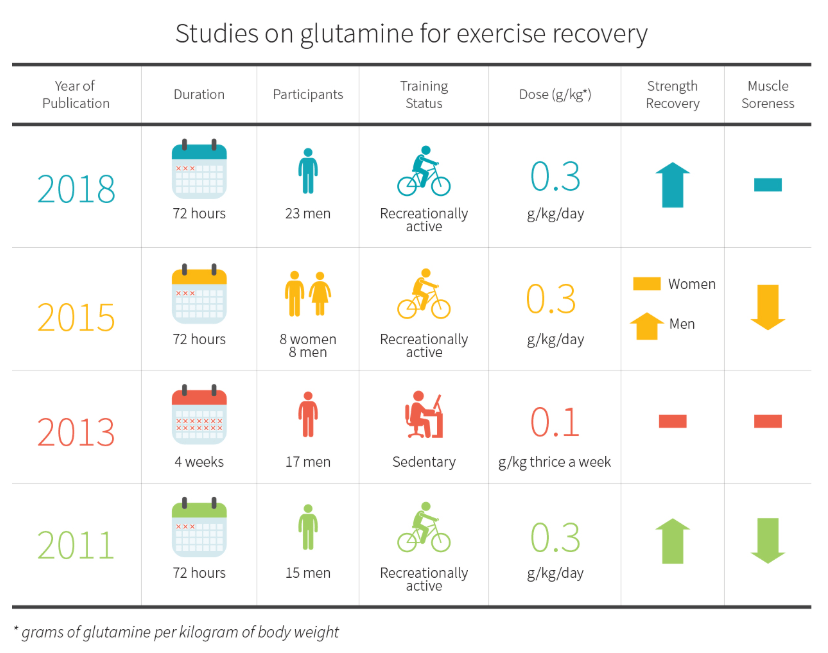
Glutamine and Growth Hormone
Studies have confirmed that glutamine supplementation may increase growth hormone levels. Research results have found out that oral intake of 2 g of glutamine will increase the level of this amino acid in plasma within 30 to 60 minutes from ingestion and it will return to normal after 90 minutes. After 90 minutes, the concentration of sodium bicarbonate and growth hormone in the bloodstream increases. This finding confirms that surprisingly low doses of glutamine can increase both alkaline reserves and growth hormone. [37]
Glutamine and Immune System
During exercise and other psychological stress such as starvation, severe injury, trauma or disease, the demand for glutamine increases. Long intensive exercise or cardio training can deplete 34-50% of glutamine from plasma, while increasing the risk of infection or disease (most commonly upper respiratory inflammation). [49]
Scientists assume that these two phenomena are related. The reason for this statement is the hypothesis that cells of the immune system – lymphocytes and macrophages are dependent on glutamine, which is their primary energy source. When immune system suppression occurs during intensive exercise, cells deplete glutamine stores from plasma and skeletal muscles. [50] Moreover, their demand for glutamine may be higher than the amount of glutamine produced or consumed by the body. [51]
However, not all studies have agreed on the assertion that glutamine supplementation after training really supports immunity. [43] One study from 1997 refuted the effect of glutamine on lymphocyte distribution with marathon runners.
Conversely, a study by Oxford University confirmed the effect of glutamine in boosting immunity and reducing infections and diseases. Scientists compared the state of health of 150 marathon runners one week after a difficult run. Half of them consumed 5 g of glutamine just after they reached the finish and the day after. The remaining runners received a placebo. The study found out that the group that received glutamine was twice as resistant to diseases for 7 days after a difficult run. [42]
To conclude, stressors such as burns, surgeries, wounds, long exhausting exercise or overtraining cause a decrease in glutamine concentration in skeletal muscles and plasma. Overtraining refers to excessive physical performance when the frequency, intensity or volume of training usually increases. It is a condition when these factors cause increased levels of the catabolic hormone cortisol, fatigue, and poor performance, depression or sickness. Usually, the athletes are overtrained after 2-3 hours of workout. [10] Studies of overloaded athletes have shown lower glutamine levels than of athletes who did not exert excessive strain on their body. [52]
Glutamine and Its Effect on Intestinal Functioning
The effect of glutamine on the support of immunity can also be understood indirectly, through its positive effects on the correct functioning of the intestines. As you know, long and demanding training is associated with the so-called leaky gut syndrome. This is a problem of the digestive tract, which causes increased intestinal permeability. This is a disease in which heat stress and reduced blood flow to the digestive tract cause intestinal cell damage, which means that the permeabilized intestine loses the ability to keep intestinal cells close together. As a result, holes begin to form in the intestine through which toxic substances, bacteria, viruses and waste products can penetrate into the body. [31]
The study confirmed that glutamine supplementation effectively reduced intestinal permeability caused by exercising. This significantly supports and benefits the overall immunity of the organism. [32]
Based on these properties of glutamine, we can say that it is an important element for athletes engaged in intense or endurance training. Glutamine can help them improve their health, so they do not have to be restricted in training for disease or other health problems. [41]
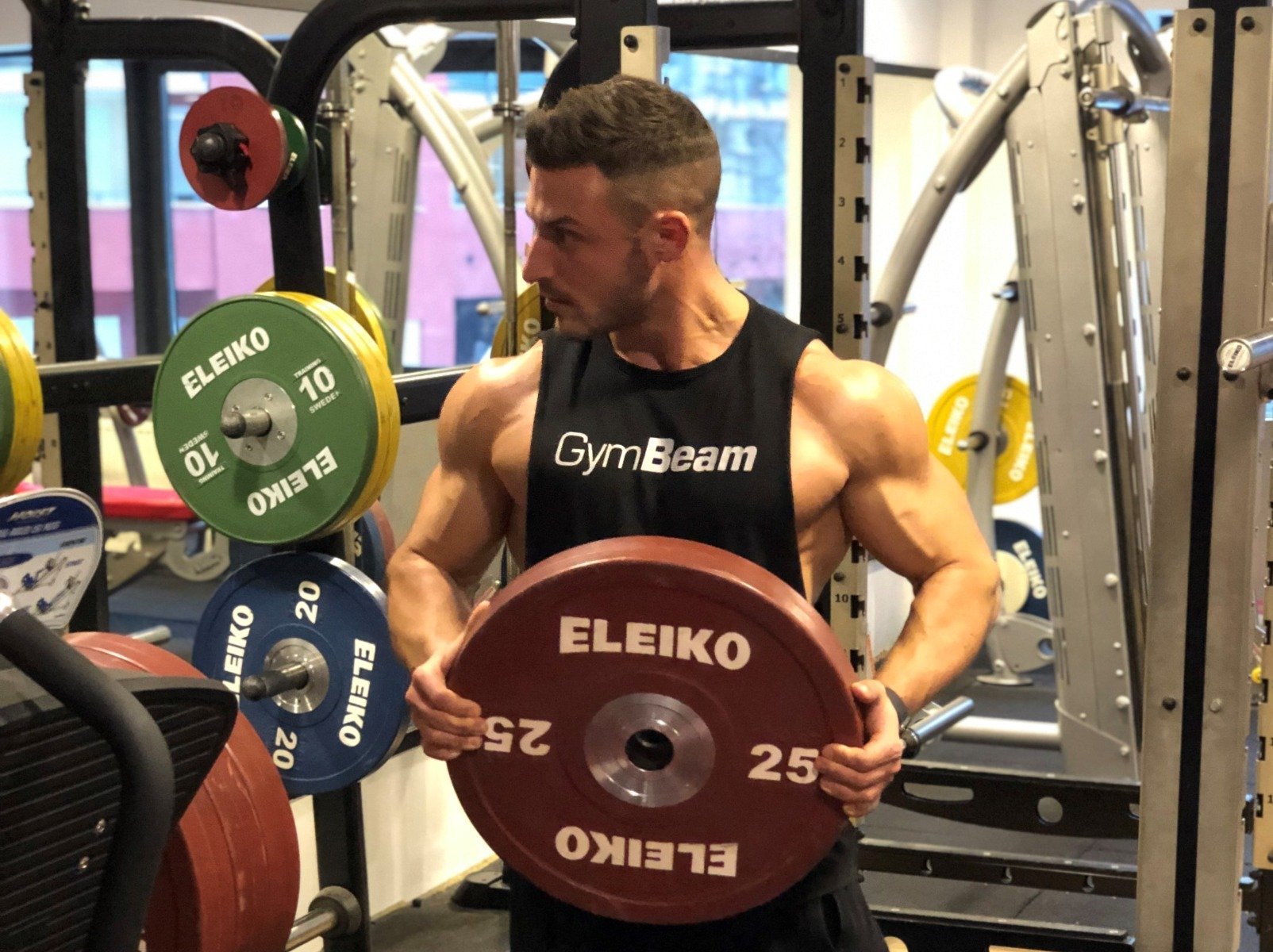
There is still vast scope for new research and findings in researching the effects of glutamine on athletes. It is just because no long-term glutamine studies or higher dose studies have been performed. We assume that glutamine will continue to be the subject of tests and new discoveries that may help athletes on their way to a strong and healthy body.
Up to the present, it is important to say that the amino acid glutamine is essential for the proper functioning of the human body. As an important element, it has an unmistakable representation in chemical processes and its benefits are also contributive during diseases. We can get enough glutamine into the body via a protein-rich diet. However, vegetarians, vegans and those who do not eat protein should consider supplementation.
Good quality glutamine as a supplement is also justified in the diet of athletes who undergo high-intensity training or demanding cardiovascular exercising. It can boost their immune system, relieve muscle pain, accelerate muscle regeneration and restore strength.
What is your experience with the usage of glutamine? Share it with us in the comments. If you found this article helpful, support it by sharing.
[1] Summary of glutamine – https://examine.com/supplements/glutamine/
[2] Glutamine uses, side effects, interactions, dosing – https://www.webmd.com/vitamins/ai/ingredientmono-878/glutamine
[3] Lenders CM, Liu S, Willmore DW, Sampson L, Dougherty LW, Spiegelman D, Willett WC - Evaluation of a novel food composition database that includes glutamine and other amino acids derived from gene sequencing data – https://www.ncbi.nlm.nih.gov/pubmed/19756030
[4] Anantika Kapoor - 8 glutamine rich foods and how they can boost your muscle strenght – https://food.ndtv.com/food-drinks/8-glutamine-rich-foods-and-how-they-can-boost-your-muscle-strength-1651641
[5] Bethany Cadman - Does L-glutamine work for IBS? – https://www.medicalnewstoday.com/articles/320850.php
[6] Christian Nordqvist - Why stress happens and how to manage it – https://www.medicalnewstoday.com/articles/145855.php
[7] Markus MacGill - What to know about radiation therapy? – https://www.medicalnewstoday.com/articles/158513.php
[8] Christian Nordqvist - What you need to know about chemotherapy – https://www.medicalnewstoday.com/articles/158401.php
[9] Adam Felman - Explaining HIV and AIDS – https://www.medicalnewstoday.com/articles/17131.php
[10] Newsholme EA - Biochemical mechanisms to explain immunosuppression in well-trained and overtrained athletes – https://www.ncbi.nlm.nih.gov/pubmed/7883396
[11] Grant Tinsley - Glutamine: Benefits, uses and side effects – https://www.healthline.com/nutrition/glutamine#section2
[12] Youji He, Theodorus B. M. Hakvoort, S. Eleonore Kohler, Jacqueline L. M. Vemeulen, D. Rudi de Waart, Cie de Theije, Gabrie A. M. ten Have, Hans M. H. van Eijk, Cindy Kunne, Wilhelmina T. Labruyere, Sander M. Houten, Milka Sokolovic, Jan M. Ruijter, Nicolaas E. P. Deutz, Wouter H. Lamers - Glutamine Synthase in Muscle is required for Glutamine production during fasting and extrahepatic ammonia detoxification – https://www.ncbi.nlm.nih.gov/pmc/articles/PMC2843202/
[13] Bergstrom J, Furst P, Norée LO, Vinnars E - Intracellular free amino acid concentration in human muscle tissue. – https://www.ncbi.nlm.nih.gov/pubmed/4829908
[14] Philip Newsholme - Why Is L-Glutamine Metabolism Important to Cells of the Immune System in Health, Postinjury, Surgery or Infection? – http://jn.nutrition.org/content/131/9/2515S.long
[15] Thomas R. Ziegler, Lorraine S. Young, Kathleen Benfell, Marc Scheltinga, Kari Hortos, Rancy Bye, Frank D. Morrow, Danny O. Jacobs, Robert J. Smith, Joseph H. Antin, Douglas W. Wilmore - Clinical and metabolis efficacy of glutamine - supplemented parenteral nutrition after bone marrow transplantation
[16] – http://citeseerx.ist.psu.edu/viewdoc/download?doi=10.1.1.847.2827&rep=rep1&type=pdf
[17] Richard G. Barton - Immune-enhancing enteral formulas: are they beneficial in critically III patients? – https://onlinelibrary.wiley.com/doi/pdf/10.1177/011542659701200251
[18] Klimber VS, Souba WW, Dolson DJ, Salloum RM, Hautamaki RD, Plumley DA, Mendenhall WM, Bova FJ, Khan SR, Hackett RL - Prophylatic glutamine protects the intestinal mucosa from radiation injury – https://www.ncbi.nlm.nih.gov/pubmed/2354410
[19] F. Hammarqvist, J. Wernerman, R. Ali, A von der Decken, E. Vinnars - Addition of glutamine to total parenteral nutrition after elective abdominal surgery spares free glutamine in muscle, counteracts the fall in muscle protein synthesis, and improves nitrogen balance – https://www.ncbi.nlm.nih.gov/pmc/articles/PMC1493967/
[20] Zieger TR, Young LS, Benfell K, Scheltinga m, Hortos K, Bye R, Morrow FD, Jacobs DO, Smith RJ, Antin JH - Clinical and metabolic efficacy of glutamine-supplemented parenteral nutrition after bone marrow transplantation. A randomized, double-blind, controlled study – https://www.ncbi.nlm.nih.gov/pubmed/1567096
[21] Olivier Le Bacquer, Nelly Mauras, Susan Welch, Morey Haymond, Dominique Darmaun - Acute depletion of plasma glutamine increases leucine oxidation in prednisone-treated humans – https://www.ncbi.nlm.nih.gov/pmc/articles/PMC1949027/
[22] Ziegler TR, Ogden LD, Singleton KD, Luo M, Fernandez-Estivariz C? Griffith DP, Galloway JR, Wischmeyer PE - Parenteral glutamine increases serum heat shock protein 70 in critically ill patients – https://www.ncbi.nlm.nih.gov/pubmed/15973519
[23] Sufit A, Weitzel LB, Haniel C, Queensland K, Dauber I, Rooyackers O, Wischmeyer PE - Pharmacologically dosed oral glutamine reduces myocardial injury in patients undergoing cardiac surgery: a randomized pilot feasibility trial – https://www.ncbi.nlm.nih.gov/pubmed/22623413
[24] Helton WS, Smith RJ, Rounds J, Willmore DW - Glutamine prevents pancreatic atrophy and fatty liver during elemental feeding – https://www.ncbi.nlm.nih.gov/pubmed/1971031
[25] Joe Cohen - 14 proven benefits of glutamine + side effects & dosage – https://www.selfhacked.com/blog/l-glutamine-15-proven-health-benefits/
[26] Josh Axe - L-glutamine benefits leaky gut & metabolism – https://draxe.com/l-glutamine-benefits-side-effects-dosage/
[27] Albrecht J, Sidoryk-Wegrzynowicz M., Zielinska M, Aschner M - Roles of glutamine in neurotransmission. – https://www.ncbi.nlm.nih.gov/pubmed/22018046
[28] Grant Tinsley - Glutamine: Benefits, Uses and side effects – https://www.healthline.com/nutrition/glutamine#section5
[29] Candow DG? Chillibeck PD, Burke DG, Davison KS, Smith-Palmer T. - Effect of glutamine supplementation combined with resistance training in youth adults. – https://www.ncbi.nlm.nih.gov/pubmed/11822473
[30] Legaultz Z, Bagnall N, Kimmerly DS - The influence of oral l-glutamine supplementation on muscle strenght recovery and soreness following unilateral knee extension eccentric exercise – https://www.ncbi.nlm.nih.gov/pubmed/25811544
[31] Cavalho-Peixoto J, Alves RC, Cameron LC . Glutamine and carbohydrate supplements reduce ammonemia increase during endurance field exercise – https://www.ncbi.nlm.nih.gov/pubmed/18059593
[32] Dokkladny K, Zuhl MN Moseley PL - Intestinal epithelial barrier function and tight junction proteins with heat and exercise – https://www.ncbi.nlm.nih.gov/pubmed/26359485
[33] Pugh JN, Sage S, Hutson M, Doran D, Fleming SC, Highton J, Morton JP, Close GL - Glutamine supplementation reduces markers of intestinal permeability during running in the heat in a dose-dependent manner – https://www.ncbi.nlm.nih.gov/pubmed/29058112
[34] Fact check: does glutamine build muscle? – https://examine.com/nutrition/does-glutamine-build-muscle/
[35] Eric R Helms, Alan A Aragon, Peter J Fitschen - Evidence-based recommendations for natural bodybuilding contest preparation: nutrition and supplementation – https://www.ncbi.nlm.nih.gov/pmc/articles/PMC4033492/
[36] Brian Street, Christopher Byrne, Roger Eston - Glutamine Supplementation in Recovery From Eccentric Exercise Attenuates Strength Loss and Muscle Soreness – https://www.sciencedirect.com/science/article/pii/S1728869X12600070
[37] Rahmani Nia F, Farzaneh E, Damirchi A, Shamsi Majlan A - Effect of L-glutamine supplementation on electromyographic activity of the quadriceps muscle injured by eccentric exercise – https://www.ncbi.nlm.nih.gov/pubmed/23997909
[38] Welbourne TC - Increased plasma bicabonate and growth hormone after an oral glutamine load. – https://www.ncbi.nlm.nih.gov/pubmed/7733028
[39] Legault Z, Bagnall N, Kimmerly DS - The Influence of Oral L-Glutamine Supplementation on Muscle Strength Recovery and Soreness Following Unilateral Knee Extension Eccentric Exercise – https://www.ncbi.nlm.nih.gov/pubmed/25811544
[40] Waldron M, Ralph C, Jeffries O, Tallent J Theis N, Patterson SD - The effects of acute leucine or leucine-glutamine co-ingestion on recovery from eccentrically biased exercise – https://www.ncbi.nlm.nih.gov/pubmed/29770871
[41] Leann D: Shewchuk, Vickie E. Baracos, Catherine J. field - Dietary L-Glutamine Supplementation Reduces the Growth of the Morris Hepatoma 7777 in Exercise-Trained and Sedentary Rats – https://academic.oup.com/jn/article/127/1/158/4728776
[42] J. E. Greig, D. G. Rowbottom, D. Keast - The effect of a common (viral) stress on plasma glutamine concentration – https://www.burnet.edu.au/publications/5076_the_effect_of_a_common_viral_stress_on_plasma_glutamine_concentration
[43] Castell LM, Poortmans JR, Leclercq R, Brasseur M, Duchateau J, Newsholme EA - Some aspects of the acute phase response after a marathon race, and the effects of glutamine supplementation – https://www.ncbi.nlm.nih.gov/pubmed/9007457
[44] Hack V, Weiss C? Friedmann B, Suttner S, Schykowski M, Erbe N, Benner A, Bartsch P, Droge W - Decreased plasma glutamine level and CD4+ T cell number in response to 8 wk of anaerobic training – https://www.ncbi.nlm.nih.gov/pubmed/9176177
[45] MacLennan PA, Smith K, Weryk B, Watt PW, Rennie MJ - Inhibition of protein breakdown by glutamine in perfused rat skeletal muscle – https://www.ncbi.nlm.nih.gov/pubmed/3169234
[46] MacLenna PA, Brown RA, Rennie MJ - A positive relationship between protein synthetic rate and intracellular glutamine concentration in perfused rat skeletal muscle – https://www.ncbi.nlm.nih.gov/pubmed/2883028
[47] R. G. Hankard, M. W. Haymond, D. Darmaun - Effect of glutamine on leucine matebolism in humans – http://ajpendo.physiology.org/content/271/4/E748.abstract
[48] Millward DJ, Jepson MM, Omer A - Muscle glutamine concentration and protein turnover in vivo in malnutrition and in endotoxemia – https://www.ncbi.nlm.nih.gov/pubmed/2668704
[49] Chris Goulet - The effects of glutamine supplementation on athletic performance! – https://www.bodybuilding.com/fun/goulet10.htm
[50] E. Roth, J. Funovics, F. Muhlbacher, M. Schemper, W. Mauritz, P. Sporn, A. Fritsch - Metabolic disorders in severe abdominal sepsis: Glutamine deficiency in skeletal muscle – https://www.clinicalnutritionjournal.com/article/0261-5614(82)90004-8/fulltext
[51] Castell LM, Poortmans JR, Leclercq R, Brasseur M, Duchateau J, Newsholme EA - Some aspects of the acute phase response after a marathon race, and the effects of glutamine supplementation – https://www.ncbi.nlm.nih.gov/pubmed/9007457
[52] Miller AL - Therapeutic considerations of L-glutamine: a review of the literature – https://www.ncbi.nlm.nih.gov/pubmed/10468648
[53] Castell LM, Newsholme EA - The effects of oral glutamine supplementation on athletes after prolonged, exhaustive exercise – https://www.ncbi.nlm.nih.gov/pubmed/9263279

